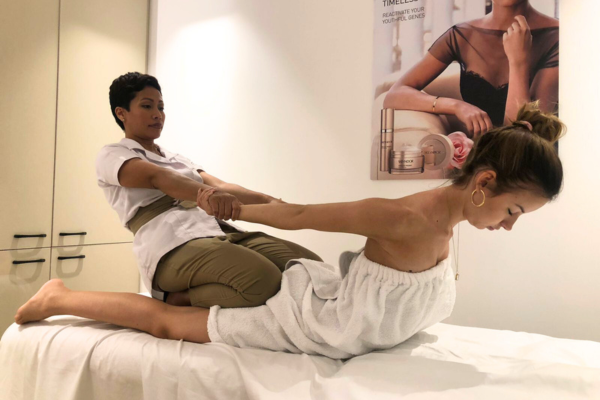Celebrate Wellness with Our Thai Massage
Unwind with Traditional Techniques

Relieve Tension
Relieve muscle tension and body stresses to help relaxing you

Relaxation
Stretching techniques and gentle pressure relax the whole body

Improve mobility
Yoga like movements ease stiffness and improve range of flexibility.
The Ancient Healing Art
Thai Massage, often hailed as the "ancient healing art," is a harmonious blend of traditional Thai therapeutic practices and passive stretching. Rooted in centuries-old traditions, this unique massage technique rejuvenates both body and mind. Unlike conventional massages, Thai Massage is performed on a comfortable mat on the floor, allowing the therapist to maneuver your body into various stretches and positions.
It's not just a massage; it's an experience. Feel the energy channels open and blockages dissolve as our skilled therapists employ their hands, elbows, knees, and feet to apply pressure. This rhythmic sequence enhances flexibility, releases muscle, and joint tension, and balances the body's energy systems.
At Maison Privee, we respect and honor the rich legacy of Thai Massage. Our therapists, trained in authentic Thai techniques, ensure each session is tailored to your needs. They guide you through gentle movements and apply pressure to specific energy lines and points, promoting a sense of deep relaxation and vitality.
Journey with us as we transport you to the heart of Thailand. Relish in the tranquility, and let the transformative power of Thai Massage harmonize your body, mind, and spirit.

Benefits of Thai Massage
Mental Benefits:
1. Stress Reduction: Thai Massage can lower cortisol (stress hormone) levels, leading to a calm and relaxed mental state.
2. Enhanced Focus: By balancing the body's energy, one often experiences increased clarity and concentration.
3. Elevated Mood: The massage can stimulate the release of endorphins, the body's natural feel-good chemicals.
4. Better Sleep: Regular sessions can improve sleep quality due to the relaxation and reduction of muscle tension.
5. Emotional Balance: The holistic approach of Thai Massage often leads to a sense of emotional well-being and balance.
Physical Benefits:
1. Improved Flexibility: The stretches in Thai Massage can enhance flexibility, reducing the risk of injuries.
2. Increased Energy: By working on the energy lines (Sen lines), it can boost vitality and fight fatigue.
3. Muscle Relaxation: The unique techniques help in relieving muscle tightness and tension.
4. Joint Relief: Thai Massage can alleviate joint pain and increase their range of motion.
5. Better Circulation: The massage techniques promote better blood flow, ensuring efficient nutrient and oxygen delivery to body cells.
Our Process

Compression
Compression in Thai massage involves rhythmic pressing movements directed into muscle tissues by either the hand or fingers. This technique improves circulation, eases muscle tension, and prepares the body for upcoming stretches, offering an initial layer of relaxation and readiness.

Stretching and Folding
Stretching and folding techniques incorporate yoga-like postures to elongate muscles and improve flexibility. The therapist may use their body weight to deepen stretches, offering a dynamic, active component to the massage that helps to release deep-seated tension.

'Sen' Technique
Acupressure points are targeted with precise finger placement to unlock energy pathways, commonly known as “sen” lines in Thai massage. This technique stimulates energy flow, alleviates blockages, and promotes overall wellness, providing a unique blend of invigoration and relaxation.
Thai massage is a traditional healing technique that originated in Thailand over 2,500 years ago. It combines acupressure, Indian Ayurvedic principles, and assisted yoga postures. Unlike Western-style massages, Thai massage usually takes place on a mat on the floor, and the recipient remains fully clothed.
Thai massage has numerous benefits, including improved flexibility, relief from muscle and joint pain, increased blood circulation, and enhanced relaxation. It can also help to reduce stress and anxiety.
While Thai massage can be intense, it should not be painful. Therapists use their hands, knees, legs, and feet to move you into a series of yoga-like stretches. If you experience discomfort, it’s important to communicate with your therapist to adjust the pressure.
Wear loose, comfortable clothing that allows for movement, and avoid eating a large meal before your session. You may also want to avoid consuming caffeine or other stimulants that could make it hard for you to relax.
A typical Thai massage session lasts between 60 and 120 minutes. However, shorter or longer sessions can be arranged based on your needs and the therapist’s offerings.
While Thai massage can be adapted for pregnant women, it is crucial to consult a healthcare provider before scheduling a session. Additionally, make sure to find a therapist specifically trained in prenatal Thai massage.
Thai massage is generally safe for most people, but certain medical conditions may contraindicate this type of therapy. Individuals with high blood pressure, certain types of cancer, or acute skin conditions should consult their healthcare providers before scheduling a Thai massage.
Tipping practices can vary depending on the country and the setting. In the United States, it is customary to tip 15-20% of the total bill. Always check local customs if you’re uncertain.
Yes, it is common for people to combine Thai massage with other types of massage or treatments like aromatherapy for added benefits. However, you should consult with your therapist to ensure the combined treatments are suitable for you.
The frequency of sessions depends on individual needs and health conditions. Some people benefit from a Thai massage as a one-time stress reliever, while others may require regular sessions for chronic conditions. Consult with your therapist for personalized recommendations.

